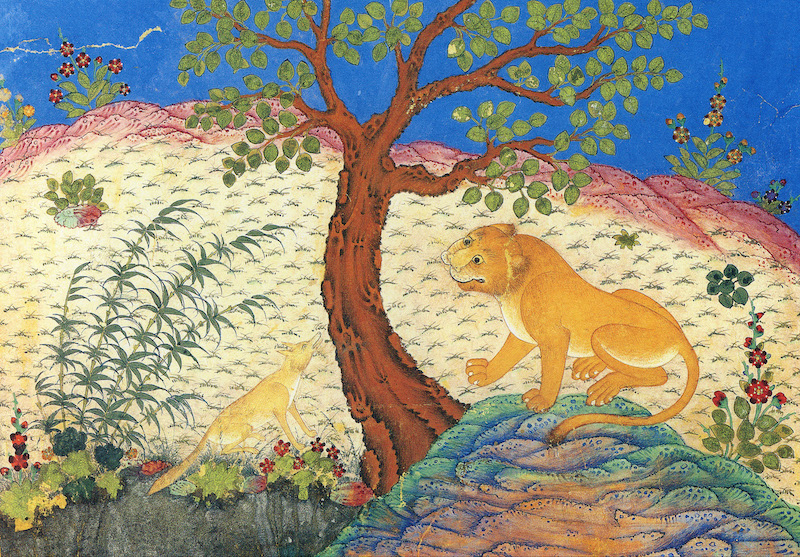
कथामुखं
The introduction
In a city called Mahilaropya, very far away from here, lived a king named Amarashakti (the ever-powerful). He took very good care of his kingdom and his subjects, and was loved and revered by all. He was a master of all the sciences and the art of politics and negotiations, of ethics and the great scriptures.
Amarashakti had three sons – Vasushakti, Ugrashakti and Anantashakti, and unfortunately for Amarashakti, his three sons were nothing like him. They were adverse to learning, arrogant and impolite.
The king tried hard, but was not able to make them understand and aware of their duties as human beings, and as heirs to the great kingdom of Mahilaropya.
And so one day, Amarashakti called a meeting of his council of ministers and said ” Oh wise men! You know my concern. My sons are wicked and foolish, and refuse to learn the scriptures, or any of the administrative sciences. This makes me very unhappy, even though I am blessed to rule such a great kingdom. It is said…”
अजात-मृत-मूर्खेभ्यो मृताजातौ सुतौ वरम् ।
यतस् तौ स्वल्प-दुःखाय यावज्-जीवं जडो दहेत् ॥ ३ ॥
ajāta-mṛta-mūrkhebhyo mṛtājātau sutau varam |
yatas tau svalpa-duḥkhāya yāvaj-jīvaṃ jaḍo dahet || 3 ||
Of the three types of children – unborn, dead and foolish, the dead and the unborn are preferred. They both give you a little pain; the foolish child pains you your whole life.
किं तया क्रियते धेन्वा या न सूते न दुग्धदा ।
को ऽर्थः पुत्रेण जातेन यो न विद्वान् न भक्तिमान् ॥ ५ ॥
kiṃ tayā kriyate dhenvā yā na sūte na dugdhadā |
ko ‘rthaḥ putreṇa jātena yo na vidvān na bhaktimān || 5 ||
What can be done with a cow that does not deliver a calf, nor yields milk? Of what use is a child who is not learned nor devoted to elders?
“You are the wisest men in the kingdom, and so please think of a way in which my sons can become intelligent and learned, so that they are fit to be called the princes of this great kingdom. There are five hundred learned men assembled here, so please discuss among yourselves and advise me on how my wishes can be fulfilled.”
The learned men had a discussion for many hours, and then one of them stepped forward and addressed the king.
“Oh wise king! Studying the texts on Grammar and Language takes twelve years, Only after that can the texts on Dharma by Manu (Manusmriti), the texts on economics by Chanakya (Arthashastra) and the treatises on life and pleasure by Vaysayana (the Kamasutra) be mastered. In this way, a student can experience the scriptures on Dharma, Artha and Kama, and know the ways of this world and beyond, and hence become intelligent.”
A minister named Sumati (the one with a good mind), stepped forward and said “Oh king! The life of a human is very short. The study of grammar will take a long time in itself. And so it would be better to think of a shorter way to educate the princes. It is said…”
पण्डितो अनन्तपारं किल शब्द-शास्त्रं स्वल्पं तथायुर् बहवश् च विघ्नाः ।
सारं ततो ग्राह्यम् अपास्य फल्गु हंसैर् यथा क्षीरम् इवाम्बुध्यात् ॥ ६ ॥
anantapāraṃ kila śabda-śāstraṃ svalpaṃ tathāyur bahavaś ca vighnāḥ |
sāraṃ tato grāhyam apāsya phalgu haṃsair yathā kṣīram ivāmbudhyāt || 6 ||
The texts on grammar are long and have a lot of depth, The life of a human being is short, and obstacles are many. And so one should attempt to grasp the essence of learning, and leave out the rest – much like swans who absorb only the milk from a mixture of milk and water.
“I know a Brahmin named Vishnu Sharma, who is also a part of this gathering. He is a master of all the sciences, and well known in teaching circles. You can ask him to accept the princes as his students. I am sure that under his guidance, the princes will be able to learn very quickly.”
Hearing this, the king called Vishnu Sharma and said “Oh great teacher! Please help me. Accept my sons as your students and make them adept in the political sciences. I will honour you by giving you one hundred villages.”
Vishnu Sharma bowed to the king and said “My king! Do listen to me very carefully. I do not sell knowledge, and so your offer of a hundred villages, does not mean anything to me. But know this – If I do not make your sons experts in the political and administrative sciences within the next six months, I will renounce my name!”
“Also know this – I am not greedy for wealth. I am eighty years old, and have renounced all my desires. What use is wealth to me? To fulfil your request, I will keep myself entertained through teaching your children. Make a note of today’s date. If I do not make your sons the foremost authorities in political and administrative sciences, you can even give me the death penalty!”
The king and his ministers were shocked at this staunch vow taken by Vishnu Sharma. They bowed to him and asked him for his blessings, and felt happy that he had accepted to teach the princes.
The next morning, the princes left for Vishnu Sharma’s ashram, and stayed there for six months. The great Brahmin taught the, the five parts of administrative science – मित्र-भेद, (Mitra-bheda), मित्र-प्राप्ति (mitra-prapti), काकोलुकीय (Kakolukeeya), लब्ध-प्रणाश (Labdha-pranaasha) and अपरीक्षितकारक (Apareekshita-karaka).
And in six months, as Vishnu Sharma had promised, the princes became experts in the sciences of politics and administration. Since then, these five parts of knowledge have been come to be known as पञ्चतन्त्रं – the Panchatantra.
